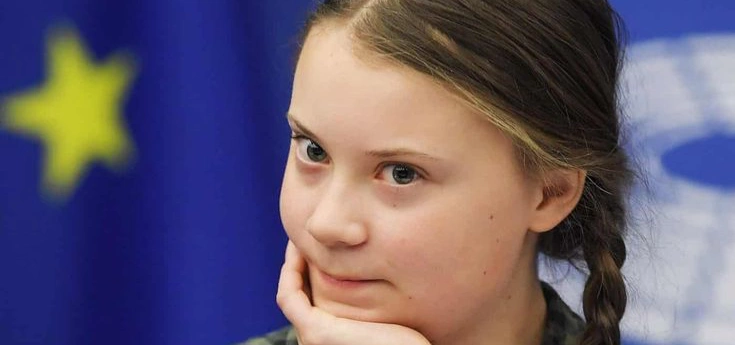Greta Thunberg — The Voice of a Planet the World Refused to Hear
She stood alone, with a sign and a silent urgency in her eyes. In August 2018, 15-year-old Greta Thunberg began her “School Strike for Climate” outside the Swedish Parliament. No one could have predicted that she would become the face of a global youth movement.
Born in 2003, Greta was diagnosed with Asperger’s syndrome at age 11. She describes it not as a disability, but as her “superpower”: it helps her speak with clarity, focus, and moral conviction.
When she learned about the climate crisis, she couldn’t understand why adults ignored the warnings. So she acted. Her solo protest sparked the global Fridays for Future movement, mobilizing millions of young people.
She speaks plainly, but powerfully. Not to insult — but to confront. Not to alarm — but to awaken.
“I don’t want your hope. I want you to panic. I want you to act as if your house is on fire. Because it is.”
Greta has spoken at the EU Parliament, Davos, and the UN Climate Summit. Her viral 2019 UN speech, filled with sorrow and rage, shook the world:
“How dare you? You have stolen my dreams and my childhood with your empty words!”
Her activism is grounded in science. She quotes reports, listens to experts, and demands action — not slogans.
Despite harsh criticism and mockery, Greta remains firm:
“When your critics attack your looks and your autism instead of your arguments, you know you’re winning.”
Greta doesn’t want to be a hero. She wants truth. She reminds us that the future isn’t tomorrow — it’s now, and it’s in our hands.

aterialists immerses viewers in the contradictions of contemporary romance, where curated identities collide with authentic emotion, and love becomes a question not just of the heart — but of value. Lucy, the protagonist at the center of it all, moves through a sleek, shimmering version of New York that feels at once aspirational and hollow. Beneath the designer heels and curated dinner parties is a woman who has spent years helping others find love — without pausing to examine her own.
The film doesn't present Lucy as broken or lost. Instead, it draws a portrait of someone quietly drifting — successful on paper, admired by clients, and envied by peers, yet increasingly unsure of what real connection even looks like. Celine Song allows Lucy’s emotional evolution to unfold with restraint, using mood, silence, and atmosphere instead of exposition. It’s a sophisticated narrative style that mirrors the complexity of real-life relationships: messy, nonlinear, unresolved.
Lucy’s internal world is mirrored by the city around her — a place built on momentum, ambition, and polish. Every scene is charged with aesthetic precision, yet the underlying tension always belongs to the characters. Through subtle shifts in color and composition, Song crafts an emotional language that speaks louder than dialogue. Rainy sidewalks, warm interiors, and lonely subway rides become emotional metaphors for what Lucy can’t always articulate: the desire to be chosen, truly seen, and loved not for what she offers — but for who she is.
Supporting characters provide contrasting perspectives that sharpen the emotional core of Lucy’s journey. Her colleague and closest confidante, played with intelligence by Zoë Chao, challenges her to confront hard truths. A client played by Bowen Yang injects levity and insight, pointing out the absurdities of dating algorithms and emotional branding. Even Lucy’s own mother, seen briefly in flashbacks and a key phone conversation, casts a long emotional shadow — a woman who once told Lucy to “marry someone with direction, not just affection.”
While the story contains elements of traditional romantic comedy — witty banter, longing glances, unexpected reunions — Materialists never settles for clichés. There are no grand airport chases, no over-the-top monologues. Instead, the film builds emotional suspense through micro-moments: hands grazing in passing, eyes searching for reassurance across crowded rooms, a breath held before revealing vulnerability.
One of the film’s most powerful motifs is the question of self-worth — not in the loud, self-help sense, but in quiet choices: staying in a relationship for comfort, confusing admiration with love, and mistaking compatibility for connection. Lucy’s arc is not about being swept off her feet, but about discovering where her feet are planted in the first place.
The score, composed by Emile Mosseri (Minari, The Last Black Man in San Francisco), gently underscores Lucy’s emotional state — alternating between soft piano themes and airy strings, creating an introspective tone that lingers even after the credits roll.
By the time the final act arrives, Materialists has done something remarkable: it invites viewers not to root for one man or the other, but to root for Lucy’s clarity. The film suggests that fulfillment isn’t found in a perfect partner, but in the courage to accept complexity — in others and in ourselves.
This role marks a turning point for Dakota Johnson, allowing her to shed earlier labels and emerge as a performer capable of subtlety, restraint, and gravitas. Her Lucy doesn’t need to be loud to be powerful. She’s smart without being cynical, open without being naive, and emotional without ever losing agency.
Materialists isn’t here to confirm fairytales. It’s here to ask what romance means in a world of transactions, facades, and curated desires — and what’s left when we strip all of that away.

Close